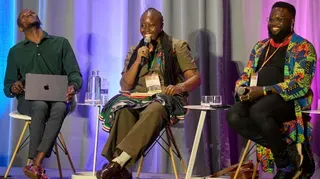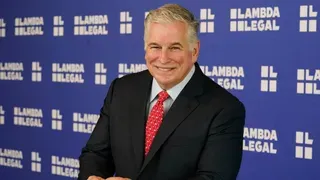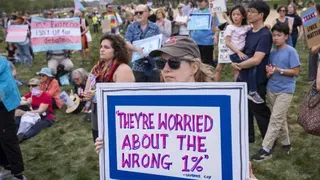December 16, 2007
Former HRC trans business leaders pave their own path
Michael Wood READ TIME: 6 MIN.
Two transgender business leaders once involved with the Human Rights Campaign have taken matters into their own hands and launched their own employment education project.
The move comes in response to HRC's decision to back a version of the Employment Non-Discrimination Act that does not include protections for gender identity. HRC, the nation's largest gay rights group, had previously committed to supporting a trans-inclusive version of ENDA.
The sexual orientation-only version of ENDA passed the House of Representatives last month.
Bay Area resident Jamison Green, 59, and Donna Rose, 48, of Arizona, tendered a joint resignation from HRC's business advisory council November 27 and launched the Transgender Employment Partnership to continue the work they began at HRC, they said.
Rose had previously resigned from HRC's board of directors, but had remained on the business council until her recent resignation.
The partnership is currently in its embryonic stages, but Green and Rose were clear that they plan to use their combined skills and experience in business leadership to continue educating business and community leaders about transgender issues. They are uncertain about how the project will evolve, but they were adamant that they plan to develop partnerships and not replace established transgender employment projects.
"Rather than being reactive and sitting back and waiting for organizations to reach out to us," said Rose, who described the project as being similar to HRC's equality forum, "for the first time ... we are taking a proactive approach that is not based on just making money, but identifying what needs to be done and coming up with a programmatic approach to address it and doing the right resources externally and internally to make it happen."
Green added, "If we can work together with others from a place of dignity we will build a stronger community and we will be more successful in achieving our goals as well."
Rose agreed with Green that it was important for the transgender community "not to rely on depending on other people's agendas or other people's limitations to affect our ability to protect our community." Rose sees the transgender movement steering toward establishing organizations and businesses and forming partnerships as being "the way that things need to go."
Rose and Green joined HRC's business council in 2002. The council was established as an advisory board of LGBT business leaders to guide HRC's Corporate Equality Index and to assist companies with making their workplaces LGBT-friendly through policies and business practices. Rose and Green provided advice about how to make the "work environment more accommodating for their transgender employees," said Rose, who saw the council as "the rubber hitting the road" in terms of addressing transgender employment issues.
In 2005, Rose said she accepted a two-year term on HRC's board of directors, which was renewed just as the ENDA battle erupted. The only transgender individual on the board at the time, she resigned in October because she couldn't justify following through with her board responsibilities to HRC after the ENDA situation. But Rose remained on the business council until last month.
Both Green and Rose described HRC as being like family and that they were deeply saddened by making the decision to sever their relationship, but not necessarily their ties, with the organization.
Rose's and Green's decision to resign from HRC's business council culminated three weeks after November 6, following HRC's change in its position on the non-inclusive ENDA that stripped protections for gender variant and transgender individuals from the legislation.
"It's part of being responsible to hold the organization accountable for things that it is doing, things that it's not doing, things that it said it would do, but didn't," said Rose. "[I] just hope in the future we learn from the mistakes."
After five years of service and investment with HRC, Green and Rose said they felt HRC would view them as assets to assist with mending the damage after the ENDA vote. But they wanted to know what HRC's plans were. They requested a face-to-face meeting with HRC President Joe Solmonese, which was met with silence, they said.
"Words, at this point, don't really hold water," said Rose, referring to the 2004 HRC board vote to support an inclusive ENDA, and more recently, Solmonese's promise at the Southern Comfort conference in September when he said HRC would "not only support, but in fact would oppose anything less than a fully inclusive version of ENDA," Rose said.
"We had been told words over the past several months and it all turned out to be empty," said Rose. "What we needed to see was action to give us some indication that the organization was serious about the commitment to the transgender community."
"It's just not acceptable," added Green, who said Solmonese's silence made him feel "disrespected, not really valued."
Solmonese and Daryl Herrschaft, director of HRC's workplace project, did not respond to requests for comment.
"Joe's door is always open to Donna and Jamison," said Brad Luna, HRC's director of communications, regarding Rose's and Green's claims that their request for a meeting went unanswered. "[They] are always welcome at the HRC. He is willing to meet with them. It is just not accurate to say that Joe was unwilling to meet with them."
Moving forward
Luna did not answer a question about how the resignations were impacting HRC. Instead, Luna preferred to focus on what HRC is doing for the transgender community.
"We are going to continue doing the work that our Corporate Equality Index and workplace project has done all along, paving the way for additional progress ... to outlaw workplace discrimination based on gender identity," said Luna.
"The truth is no organization did more than HRC did to try to pass an inclusive bill in Congress," he added.
HRC has already set in motion a program to begin healing the wounds inflicted by the ENDA vote, according to Luna and Dr. Dana Beyer, who accepted a position on HRC's board of governors in October. Beyer also is a board member of the National Center for Transgender Equality.
During a telephone interview, Luna wouldn't say exactly what HRC's plans are to bridge the rift in the transgender community, but that a plan would be released soon. Luna told the B.A.R. that HRC is working with its transgender members on HRC steering committees across the U.S. "to gauge their input to see what we need to do to move forward." He said the organization is actively seeking to fill Green's and Rose's vacancies with transgender individuals.
On December 1, HRC held a town hall meeting at the University of Connecticut's main campus in Storrs with panelists from the Gender Public Advocacy Coalition, Massachusetts Transgender Political Coalition, and Lambda Legal Defense and Education Fund to discuss ENDA.
Luna didn't respond to the B.A.R.'s question if the Connecticut meeting was an example of HRC's mending fences or if a town hall meeting was scheduled for San Francisco. Nor did he provide requested information about how many transgender individuals represent HRC on various committees or were on the organization's staff.
According to Rose, HRC doesn't have any transgender staff and only Beyer is in a lay leadership position.
Beyer, 55, plans to remain on the board of governors, even though she believes HRC owes the transgender community an apology for failing to follow through on its commitment to the community.
When asked if she's spoken with Solmonese recently, she said, "Yes, I've spoken with him directly. He wants to make things work. He admitted that he misspoke in Atlanta [at Southern Comfort] ... HRC is speaking as a lobbying organization. There are nuances to political work that don't translate well into civil rights work."
Beyer told the B.A.R. she is working with an estimated 20 transgender members of HRC at various levels to create educational programs.
"I believe that we will move forward and be stronger as a result of this," said Beyer, who sees the ENDA debacle as an educational opportunity. "It's too bad that we didn't do this right, but since we did it wrong, I think there is a lot to be learned from it ... I hope that this whole ENDA experience will encourage more trans people to come out and get involved however difficult it may be."
But Rose and Green are moving on with their program.
"It's very important that we learn the difference between standing on our own and working in coalition," said Green. "It's important that we as a community realize that we can do these things."
For more information, visit http://www.transeducate.com.
Michael Wood is a contributor and Editorial Assistant for EDGE Publications.







